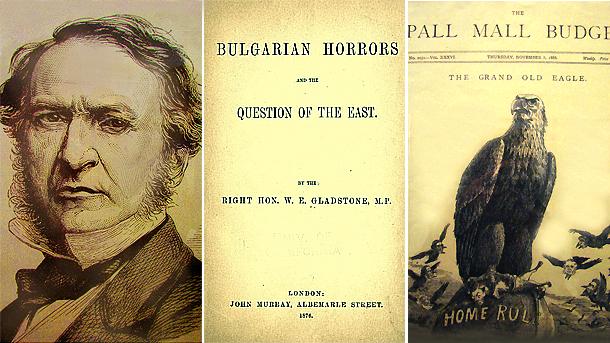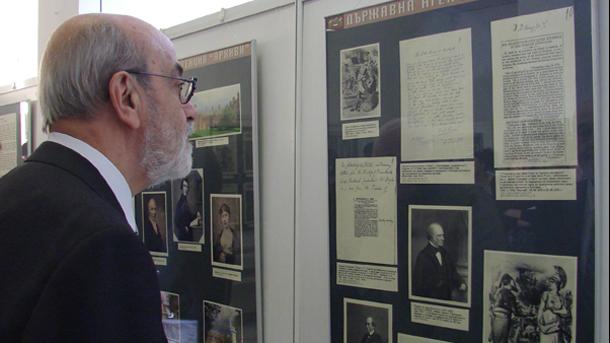
 “William Gladstone was a powerful figure in Victorian politics and served four times as prime minister. He advocated free trade; founded the Post Savings Bank and introduced state primary education in Britain. His outstanding achievements in human rights and liberties and for greater political and economic freedom have been widely recognized. Even today Gladstone is acknowledged as one of the greatest British prime ministers. Winston Churchill was among those who saw in him a source of inspiration. He has been remembered not only as premier, but also as a great reformer and a devoted Christian. Absolutely shocked by the massacre of thousands of Bulgarians in the aftermath of the 1876 April Uprising, he published a poignant, polemic brochure, “The Bulgarian Horrors and the Question of the East”. In the course of just one month the pamphlet sold in 200,000 copies. Gladstone urged other prominent figures such as Giuseppe Garibaldi to join the Bulgarian cause. The campaign that he opened led to all-European demands for reforms in the Ottoman Empire. They contributed to Bulgaria’s reemergence as an independent nation in 1878. Gladstone’s activities won him a heroic aura, and his name became popular in Bulgaria.”
“William Gladstone was a powerful figure in Victorian politics and served four times as prime minister. He advocated free trade; founded the Post Savings Bank and introduced state primary education in Britain. His outstanding achievements in human rights and liberties and for greater political and economic freedom have been widely recognized. Even today Gladstone is acknowledged as one of the greatest British prime ministers. Winston Churchill was among those who saw in him a source of inspiration. He has been remembered not only as premier, but also as a great reformer and a devoted Christian. Absolutely shocked by the massacre of thousands of Bulgarians in the aftermath of the 1876 April Uprising, he published a poignant, polemic brochure, “The Bulgarian Horrors and the Question of the East”. In the course of just one month the pamphlet sold in 200,000 copies. Gladstone urged other prominent figures such as Giuseppe Garibaldi to join the Bulgarian cause. The campaign that he opened led to all-European demands for reforms in the Ottoman Empire. They contributed to Bulgaria’s reemergence as an independent nation in 1878. Gladstone’s activities won him a heroic aura, and his name became popular in Bulgaria.”  “He did all that when Britain was a leading Great Power in Europe, and according to some even the superpower of the 19 c.”, Associate Prof. Genov explains. “In fact he was the most powerful figure on the British and the world political scene. However, Gladstone supported Bulgaria chiefly because he was a Christian statesman who was convinced that the power and influence of his country should be based on the principle of morality and moral leadership. With this in mind he backed other nations struggling for freedom: Irish, Greeks, Italians, Afghans, Zulus. He was known to the Bulgarian opinion leaders since 1860s when he served as prime minister for the first time. However, he rose to the status of a hero for them in 1876 when he put to use the whole of his fiery rhetoric to condemn the atrocities committed by the Sultan’s government and his functionaries, and to point a finger at the moral responsibility of the then-British government that would tolerate those actions for the sake of keeping the status quo in Eastern Europe intact. Some might say: Gladstone did no great deal – writing pamphlets and making speeches. However, we should be aware that the art of rhetoric was highly regarded at that time, and that the British Empire was actually ruled through speeches made in parliament, while the press emerged as the fourth estate. For all this the impact of Gladstone’s efforts was huge, and the then-Bulgarian leaders knew that perfectly well. In 1876 Todor Ikonomov, a renowned Bulgarian intellectual and politician, wrote that Gladstone had erected a monument in the heart of every aware Bulgarian with his intervention into the Eastern Crisis. For our compatriots of that time Gladstone was one of Bulgaria’s liberators. Later in time he defended the Bulgarian cause on other occasions with the firm thesis that the Bulgarians are capable of their own government by virtue of their constitution. He firmly supported the Unification of Northern with Southern Bulgaria in 1885.”
“He did all that when Britain was a leading Great Power in Europe, and according to some even the superpower of the 19 c.”, Associate Prof. Genov explains. “In fact he was the most powerful figure on the British and the world political scene. However, Gladstone supported Bulgaria chiefly because he was a Christian statesman who was convinced that the power and influence of his country should be based on the principle of morality and moral leadership. With this in mind he backed other nations struggling for freedom: Irish, Greeks, Italians, Afghans, Zulus. He was known to the Bulgarian opinion leaders since 1860s when he served as prime minister for the first time. However, he rose to the status of a hero for them in 1876 when he put to use the whole of his fiery rhetoric to condemn the atrocities committed by the Sultan’s government and his functionaries, and to point a finger at the moral responsibility of the then-British government that would tolerate those actions for the sake of keeping the status quo in Eastern Europe intact. Some might say: Gladstone did no great deal – writing pamphlets and making speeches. However, we should be aware that the art of rhetoric was highly regarded at that time, and that the British Empire was actually ruled through speeches made in parliament, while the press emerged as the fourth estate. For all this the impact of Gladstone’s efforts was huge, and the then-Bulgarian leaders knew that perfectly well. In 1876 Todor Ikonomov, a renowned Bulgarian intellectual and politician, wrote that Gladstone had erected a monument in the heart of every aware Bulgarian with his intervention into the Eastern Crisis. For our compatriots of that time Gladstone was one of Bulgaria’s liberators. Later in time he defended the Bulgarian cause on other occasions with the firm thesis that the Bulgarians are capable of their own government by virtue of their constitution. He firmly supported the Unification of Northern with Southern Bulgaria in 1885.” 
To this present day Bulgarians are very grateful for Gladstone’s advocacy. In 1909 his 100th birth anniversary turned into a national celebration with high-profile events held in parliament, at Sofia University, in schools and churches. A Bulgarian delegation was sent to attend centenary events in Britain, and laid a wreath at his monument with the following inscription: To the great William Gladstone from the grateful Bulgarian people. When in 1928 his son Viscount Herbert Gladstone came to Sofia, he was made honorary citizen of the capital city, and his visit gave rise to major street rallies of gratitude. Twenty years back, on the eve of democratic changes, his great grandson Sir William Gladstone made a visit to Bulgaria to open an exhibition devoted to the great British politician. Some of the items featured then are on display at the current exhibition.

Today dozens of streets and a few schools in Bulgaria are named after William Gladstone. Two Bulgarian historians, Andrey Pantev and Roumen Genov, have written monographs about him. To mark his 200th birth anniversary the New Bulgarian University hosted an international conference. One of the halls there will be given his name. A documentary film about the British politician is in the making. Mati Bolgaria society organizes a concert for Gladstone’s 200th birth anniversary and the Sofia City Hall has decided to build a monument to him in the capital city.
English version: Daniela Konstantinova
Archaeologists have discovered a very rare and valuable glass bottle in a 2nd-century tomb in the southern necropolis of the Roman colony Deultum near the village of Debelt (Southeastern Bulgaria). What makes it unique is that it depicts the myth of..
The Days of Croatian Archaeological Heritage, which will last until 8 November, begin today at the National Archaeological Institute with Museum at the Bulgarian Academy of Sciences (NAIM-BAS) in Sofia. The event is organised by the Croatian Embassy in..
Today, 6 November, marks 104 years since the annexation of the Western Outlands in 1920. Traditionally Bulgarian territories in south-eastern Serbia and northern Macedonia were ceded to the Kingdom of Serbs, Croats and Slovenes in 1920 as a result of..
The Patriarchal Cathedral of St Alexander Nevsky is celebrating its temple feast today. The cathedral, a symbol of the Bulgarian capital, was built "in..

+359 2 9336 661
